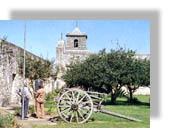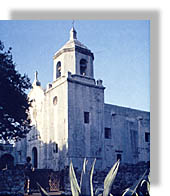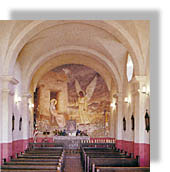 General- General-
One of Texas' oldest municipalities, the area was inhabited long
before recorded history. Early Spanish explorers list an Aranama Indian village at
the site, then called Santa Dorotea. In 1749 Spain established a mission and as was
custom, a nearby presidio (fort) for protection. "Remember
Goliad" became a Texas Revolution battle cry honoring Col. James W. Fannin Jr. and
his men who were massacred at Goliad. Memorial services at the grave of Colonel
Fannin and his troops is performed on the weekend near March 27.
Fannin Plaza-
This city park at S. Market and Franklin Streets, includes Texas
Revolution cannon, memorial shaft and several historical markers. Nearby is
"hanging tree" on the courthouse lawn and Market House Museum.
General Zaragoza State Historic Site-
Both a state park and international historic site, reconstructed
birthplace and statue of one of Mexico's most famous military figures, General Ignacio
Zaragoza (1829-1862). The Mexican general and liberal leader was minister of war
under Juarez. In 1862 he commanded an outnumbered and poorly equiped Mexican army in
defense of the Central Mexico city of Puebla against elite Frence forces. Zaragoza
flung back the attacking army, inflicting heavy losses and forcing its withdrawal to the
east coast. It is not generally known that this French army had proposed to march
into Texas to establish aid and a supply line to Confederate forces. The battle
date, Cinco de Mayo (May 5), is a national holiday throughout Mexico, and is celebrated
here and in several Texas cities. The site is two miles south off U.S. 183 at
Presidio La Bahia.
 Goliad State Park- Goliad State Park-
188 acre park features restored Mission Nuestra Senora del
Espiritu Santo de Zuniga, generally called Mission Espiritu Santo.
Excellent interpretive displays, plus camping and picnicking area, rest rooms and
river fishing spots. The Mission was established in 1749 to Christianize Indian
inhabitants of the area. Located one mile south off U.S. 183. A junior-size
Olympic swimming pool, across the highway and not a part of the park is operated by the
city of Goliad. Open noon-8p.m. in summer.
Grave of Col. James W. Fannin Jr. and Men-
A monument marks the grave of Colonel Fannin and 342 men who had
surrendered to Mexican forces during the Texas Revolution and were massacred at the order
of General Santa, Anna on Palm Sunday morning, March 27, 1836. Located two miles
south of Goliad off U.S. 183, a few hundred yards from Presidio La Bahia.
Market House Museum-
Quaint structure with cupola on the courthouse square. Local
historical artifacts, and chamber of commerce offering details and brochures about
abundant historic sites in this area. Open Wed.- Sat. 10 a.m. - 3 p.m.
Located at Franklin and Market streets.
 Presidio La Bahia- Presidio La Bahia-
As conquistadors of centuries ago explored new lands for "God,
Gold and Glory," the Church played an integral part in colonization and dominion over
vast New World empires. Missions were often the first permanent Spanish settlement
in new areas. To protect mission endeavors, a presidio (fort) was usually
built nearby and named by Spanish military forces.
Such was Presidio Santa Maria del Loreto de la Bahia, established in
1749 near Mission Espiritu Santo. It grew into one of the more important forts on
the Spanish frontier, and is the finest example of a complete Spanish presidio in Texas.
Its chapel is still in regular use for religious services.
Excavation and restoration of the massive stone walls and other
structures of the fort have been completed by the Kathryn O'Connor Foundation.
It was in this presidio during the 1836 Texas Revolution, that
Fannin's men were imprisoned after their surrender. They were subsequently massacred
in violation of honorable terms upon which they had laid down their arms.
A museum houses articles discovered during restoration, including
memorabilia of the Texas Revolution, and artifacts indicating nine levels of civilization
at the site. Open daily 9 a.m. - 5 p.m. except Good Friday and Christmas.
Located two miles south off U.S. 183, immediately south of San Antonio River. |


